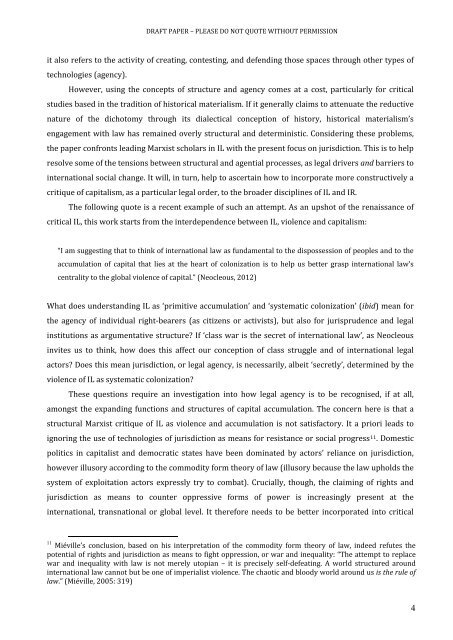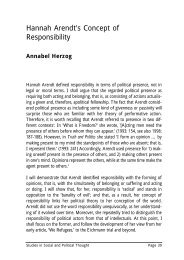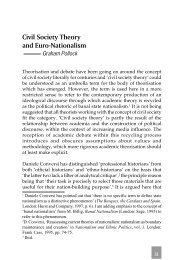Historical Materialism and International Law - University of Sussex
Historical Materialism and International Law - University of Sussex
Historical Materialism and International Law - University of Sussex
Create successful ePaper yourself
Turn your PDF publications into a flip-book with our unique Google optimized e-Paper software.
DRAFT PAPER – PLEASE DO NOT QUOTE WITHOUT PERMISSION<br />
it also refers to the activity <strong>of</strong> creating, contesting, <strong>and</strong> defending those spaces through other types <strong>of</strong><br />
technologies (agency).<br />
However, using the concepts <strong>of</strong> structure <strong>and</strong> agency comes at a cost, particularly for critical<br />
studies based in the tradition <strong>of</strong> historical materialism. If it generally claims to attenuate the reductive<br />
nature <strong>of</strong> the dichotomy through its dialectical conception <strong>of</strong> history, historical materialism’s<br />
engagement with law has remained overly structural <strong>and</strong> deterministic. Considering these problems,<br />
the paper confronts leading Marxist scholars in IL with the present focus on jurisdiction. This is to help<br />
resolve some <strong>of</strong> the tensions between structural <strong>and</strong> agential processes, as legal drivers <strong>and</strong> barriers to<br />
international social change. It will, in turn, help to ascertain how to incorporate more constructively a<br />
critique <strong>of</strong> capitalism, as a particular legal order, to the broader disciplines <strong>of</strong> IL <strong>and</strong> IR.<br />
The following quote is a recent example <strong>of</strong> such an attempt. As an upshot <strong>of</strong> the renaissance <strong>of</strong><br />
critical IL, this work starts from the interdependence between IL, violence <strong>and</strong> capitalism:<br />
“I am suggesting that to think <strong>of</strong> international law as fundamental to the dispossession <strong>of</strong> peoples <strong>and</strong> to the<br />
accumulation <strong>of</strong> capital that lies at the heart <strong>of</strong> colonization is to help us better grasp international law’s<br />
centrality to the global violence <strong>of</strong> capital.” (Neocleous, 2012)<br />
What does underst<strong>and</strong>ing IL as ‘primitive accumulation’ <strong>and</strong> ‘systematic colonization’ (ibid) mean for<br />
the agency <strong>of</strong> individual right-bearers (as citizens or activists), but also for jurisprudence <strong>and</strong> legal<br />
institutions as argumentative structure? If ‘class war is the secret <strong>of</strong> international law’, as Neocleous<br />
invites us to think, how does this affect our conception <strong>of</strong> class struggle <strong>and</strong> <strong>of</strong> international legal<br />
actors? Does this mean jurisdiction, or legal agency, is necessarily, albeit ‘secretly’, determined by the<br />
violence <strong>of</strong> IL as systematic colonization?<br />
These questions require an investigation into how legal agency is to be recognised, if at all,<br />
amongst the exp<strong>and</strong>ing functions <strong>and</strong> structures <strong>of</strong> capital accumulation. The concern here is that a<br />
structural Marxist critique <strong>of</strong> IL as violence <strong>and</strong> accumulation is not satisfactory. It a priori leads to<br />
ignoring the use <strong>of</strong> technologies <strong>of</strong> jurisdiction as means for resistance or social progress 11 . Domestic<br />
politics in capitalist <strong>and</strong> democratic states have been dominated by actors' reliance on jurisdiction,<br />
however illusory according to the commodity form theory <strong>of</strong> law (illusory because the law upholds the<br />
system <strong>of</strong> exploitation actors expressly try to combat). Crucially, though, the claiming <strong>of</strong> rights <strong>and</strong><br />
jurisdiction as means to counter oppressive forms <strong>of</strong> power is increasingly present at the<br />
international, transnational or global level. It therefore needs to be better incorporated into critical<br />
11 Miéville’s conclusion, based on his interpretation <strong>of</strong> the commodity form theory <strong>of</strong> law, indeed refutes the<br />
potential <strong>of</strong> rights <strong>and</strong> jurisdiction as means to fight oppression, or war <strong>and</strong> inequality: “The attempt to replace<br />
war <strong>and</strong> inequality with law is not merely utopian – it is precisely self-defeating. A world structured around<br />
international law cannot but be one <strong>of</strong> imperialist violence. The chaotic <strong>and</strong> bloody world around us is the rule <strong>of</strong><br />
law.” (Miéville, 2005: 319)<br />
4
















